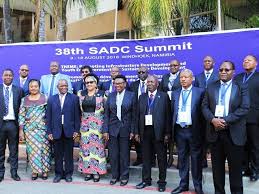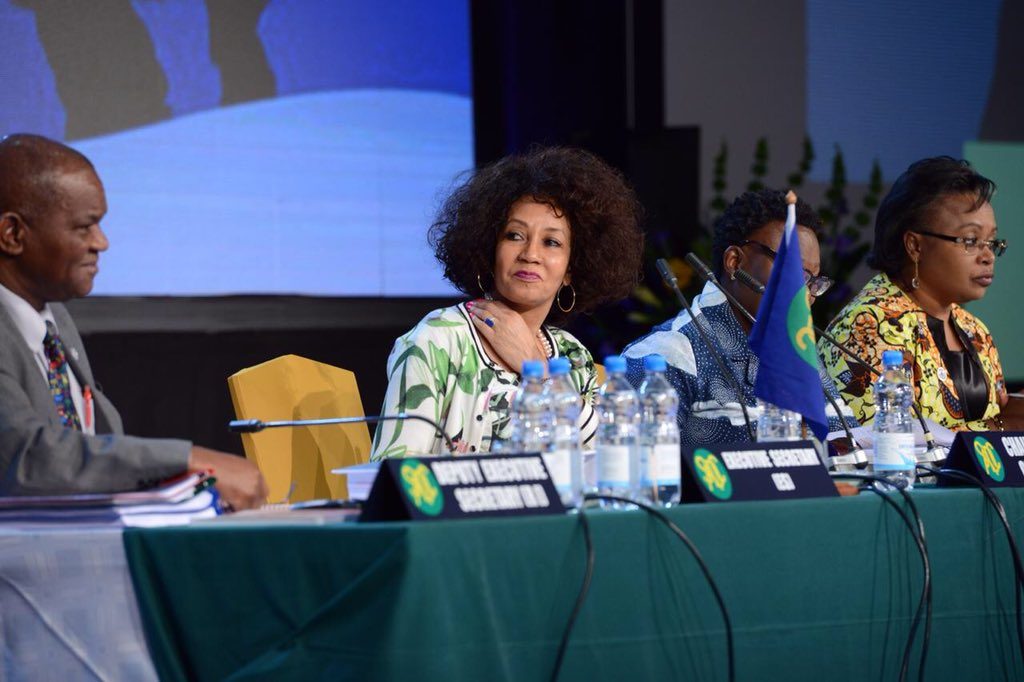Namibia was the birth of the renewed thrust towards development in the sub-continent. SADC Holds 38th Summit in Windhoek as Challenges Face the Region
Featured image: SADC 38th Summit with outgoing chair President Cyril Ramaphosa and his successor President Hage Geingob of Namibia.
Perhaps the most consistent regional organization on the African continent recently completed its summit meeting in the Republic of Namibia held on August 17-18 under theme of “Promoting Infrastructure Development and Youth Empowerment for Sustainable Development”.
Namibia was the founding location in August 1992 when the Southern African Development Community (SADC) was transformed from the Southern African Development Coordination Conference (SADCC) initiated in 1980.
During the early 1990s, the South West Africa People’s Organization (SWAPO) had completed the independence process after the defeat of the apartheid regime’s South African Defense Forces (SADF) in neighboring Angola. Cuban Internationalists, the military forces of the Popular Movement for the Liberation of Angola (MPLA)-led government (FAPLA), along with People’s Liberation Army of Namibia (PLAN), the armed wing of SWAPO and Umkhonto We Sizwe, the armed divisions of the African National Congress (ANC), combined their forces to defeat the settler-colonial regime in the south of the oil-rich nation. A ceasefire between the revolutionary forces of Cuba, Angola, Namibia and South Africa, backed by overwhelming public opinion within the African continent, and the racist regime in Pretoria, resulted in a negotiated withdrawal from Angola by the SADF allowing for internationally-supervised democratic elections to take place in the-then South West Africa, which became Namibia at the time of liberation on March 21, 1990.
Today’s president of Namibia, Hage Geingob, faces challenges in his task as the chair of the organization. Within his own country the intensification of a debate around land redistribution is scheduled for later this year.
After a quarter century of national independence the question of land ownership along with natural resources have not been resolved. The apartheid regime represented a subordinate outlet of the world capitalist system. Land and mineral theft fueled the profit-making mechanism which held the majority African population in virtual bondage.
In neighboring South Africa the land question is also generating international attention. A resolution passed in April by the National Assembly indicated that further measures would be taken to constitutionally facilitate the expropriation the agricultural areas and mines for the benefit of African people.
United States President Donald Trump in late-August stated through twitter that he was ordering Secretary of State Mike Pompeo to investigate the deaths of white farmers in South Africa and the political process related to land reform. These comments generated a rebuke from leading figures within the South African body politic including President Cyril Ramaphosa and Foreign Affairs Minister Lindiwe Sisulu.
A statement issued by Sisulu on the eve of the 38th Summit addressed South Africa’s role as chair of SADC over the past year. She noted that:
“We needed to maintain the focus, in particular, on industrial development, promotion of regional value chains and value addition in the region. In this regard, the theme for our tenure of office, ‘Partnering with the Private Sector in Developing Industry and Regional Value Chains’, was chosen with the full realization that our goals can only be met if we focus on strong and meaningful partnerships with the private sector, which is part of the engine for sustainable economic growth. Through the SADC Industrialization Strategy and Roadmap, we recognize that trade liberalization can meaningfully contribute towards sustainable and equitable development, whilst meeting the goals for poverty alleviation. Production should not only be in terms of quantities, but also quality, based on effective and efficient systems, while being mindful of the comparative advantages of SADC member states. “
Other Issues Related to the Crisis of Governance in the Union of Comoros, Western Sanctions Against Zimbabwe and the DRC Political Transition
SADC membership extends from South Africa, Lesotho, eSwatini (formerly Swaziland) and Namibia to as far north as the Central African state of the Democratic Republic of Congo (DRC). Going east, the African islands-nations of Mauritius, Madagascar, Union of the Comoros and Seychelles are also member-states.
SADC 38th Summit participants in Namibia
The most recent member, the Union of the Comoros in the Indian Ocean, has experienced political difficulties. A referendum passed in mid-August sponsored by President Azali Assoumani extends his term in office and abolishes the constitutional court.
These moves have angered the opposition forces including the Juwa Party whose Secretary General Ahmed el-Barwan has been arrested. In addition, the former President Ahmed Abdallah Sambi has as well been placed in detention. The administration of President Assoumani announced that there was a post-referendum attempted military coup which is necessitating the enhanced security measures.
Comoros consists of a three island archipelago in which the government has sovereignty. The fourth island, Mayotte, is claimed by Paris to be French territory. France is the former colonial power which relinquished control of the three islands in 1975.
After meeting several legal requirements Comoros was admitted to full membership of SADC at its August summit. The nation becomes the 16th state to be a part of the regional organization.
Namibian head-of-state President Hage Geingob as the new SADC chair has committed to working towards a political solution to the crisis. Opposition parties have appealed for “international assistance” in addressing what they charge as the undemocratic practices of Assoumani.
After the Republic of Zimbabwe held harmonized national elections on July 30 with numerous foreign observer teams invited to monitor the polls, the U.S. and Britain have still not lifted sanctions. SADC has made a renewed call for the abolition of the economic embargo on Zimbabwe in light of the recent multi-party elections and the transparency under which the results were tabulated and transmitted irrespective of allegations made by the western-backed opposition Movement for Democratic Change Alliance (MDC-T), which made a failed attempt to overturn the results through a petition to the constitutional court.
In the DRC, incumbent President Joseph Kabila has agreed to not seek another term in office after elections have been delayed for more than a year. SADC pledged to assist DRC in making the transition to new leadership smooth and efficient.
The region as a whole is rich in mineral, agricultural and energy resources. South Africa encompasses the largest economy and most industrialized state on the continent. SADC countries are part of a preferential trade agreement with the European Union (EU) along with some countries which have been involved in the U.S.-sponsored Africa Growth and Opportunity Act (AGOA) in effect since 2000.
Foreign Relations and the Quest for Economic Development
SADC has set goals to rapidly increase the process of industrialization. Nonetheless, the character of western capitalist relations in terms of ownership and trade continue to serve as impediments.
Volatility in the commodities export market has considerably slowed economic prospects for several regional states. Mozambique, which was considered in recent years as having one of the fastest growing national economies in the SADC region and beyond, has been compelled to restructure its financial obligations to the international financial institutions dominated by the western states.
Although the mineral wealth and relatively stable political situation in the SADC region has given the area an advantage, the broader international dominance of finance capital can ultimately determine the economic well-being of the sub-continent. These structural contradictions between the West and African Union (AU) countries are a challenge in obtaining sustainable industrialization and consistent growth.
SADC 38th Summit with South Africa Foreign Affairs Minister Lindiwe Sisulu
The imperative is to increase inter-African trade both within the SADC region and the larger African continent. Yet the demand for foreign exchange and access to capital, no matter how successful, does not necessarily result in the capacity for independent economic sovereignty.
Some are looking at the newly-proposed African Continental Free Trade Area (AfCFTA) adopted for implementation at a special summit of the AU in Rwanda on March 21, 2018. However, some governments within SADC and the broader continent are treading softly as it relates signing and ratifying the pact due to considerations based upon their national and international foreign investment portfolios and trade priorities.
What is required are bold approaches to economic integration informed by the need to severe the tentacles of dependency and embark upon radical transformation. Such a domestic and foreign policy orientation would inevitably strengthen the potential for long-term genuine development based upon the needs of the majority of people within these respective African societies.
*
Abayomi Azikiwe is the editor of Pan-African News Wire. He is a frequent contributor to Global Research.
All images in this article are from the author.
The original source of this article is Global Research
Copyright © Abayomi Azikiwe, Global Research, 2018
https://www.globalresearch.ca/youth-empowerment-for-sustainable-development-in-southern-africa/5652461
Counter Information published this article following the Creative Commons rule. If you don't want your article to appear in this blog email me and I will remove it asap.
Follow @counter_info






















No comments:
Post a Comment